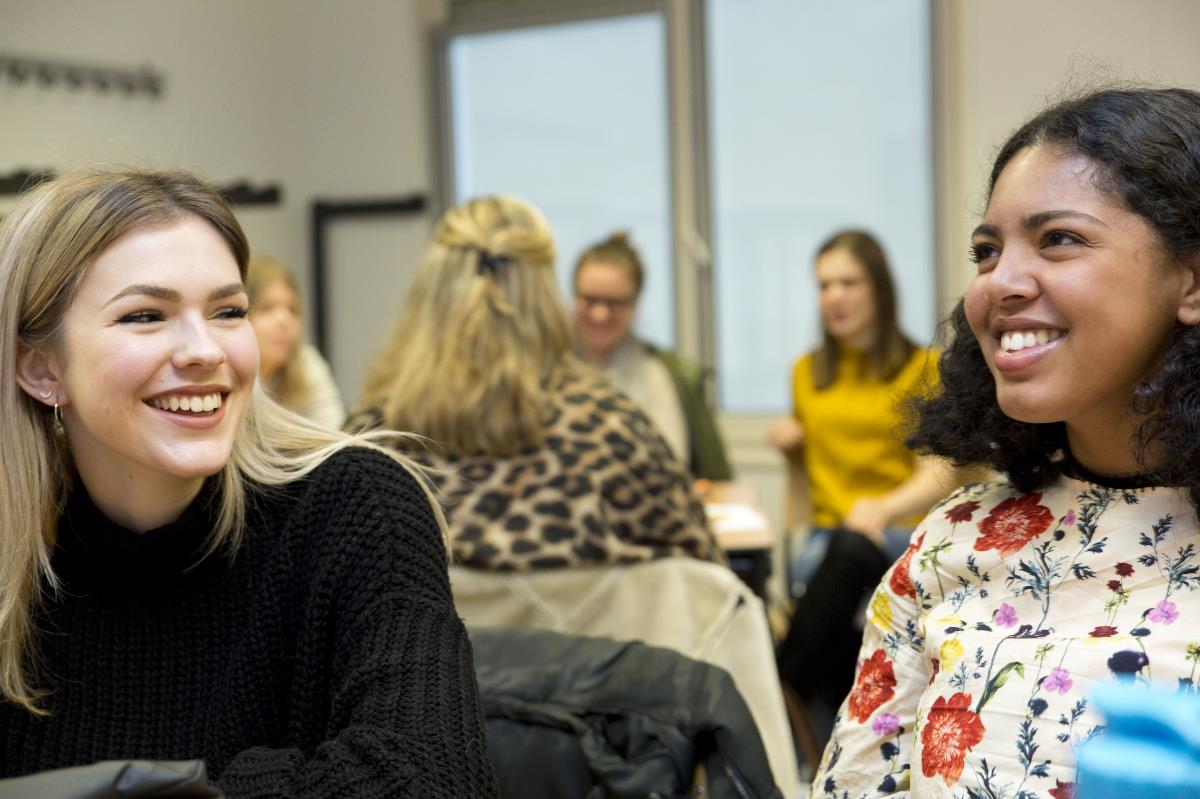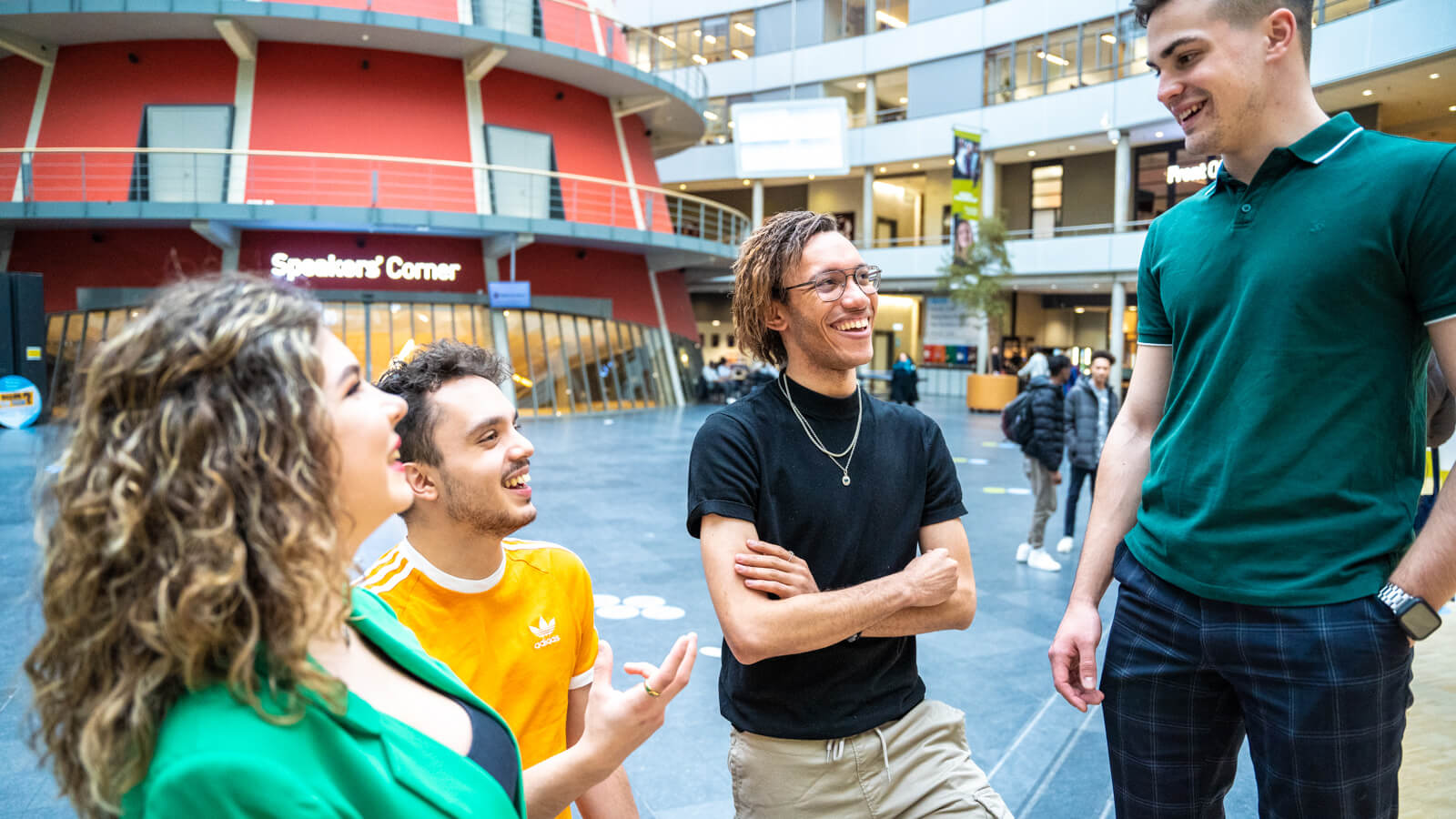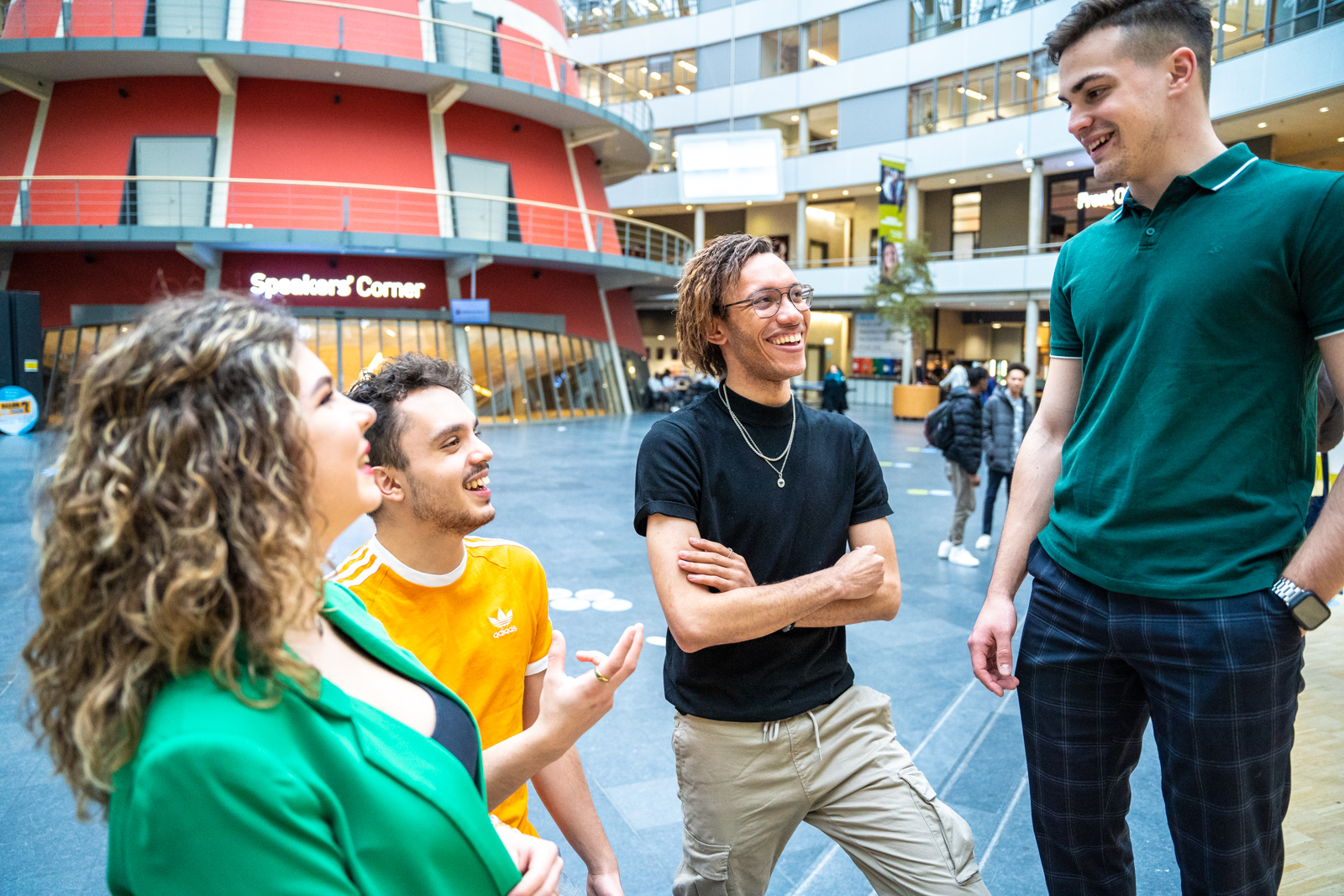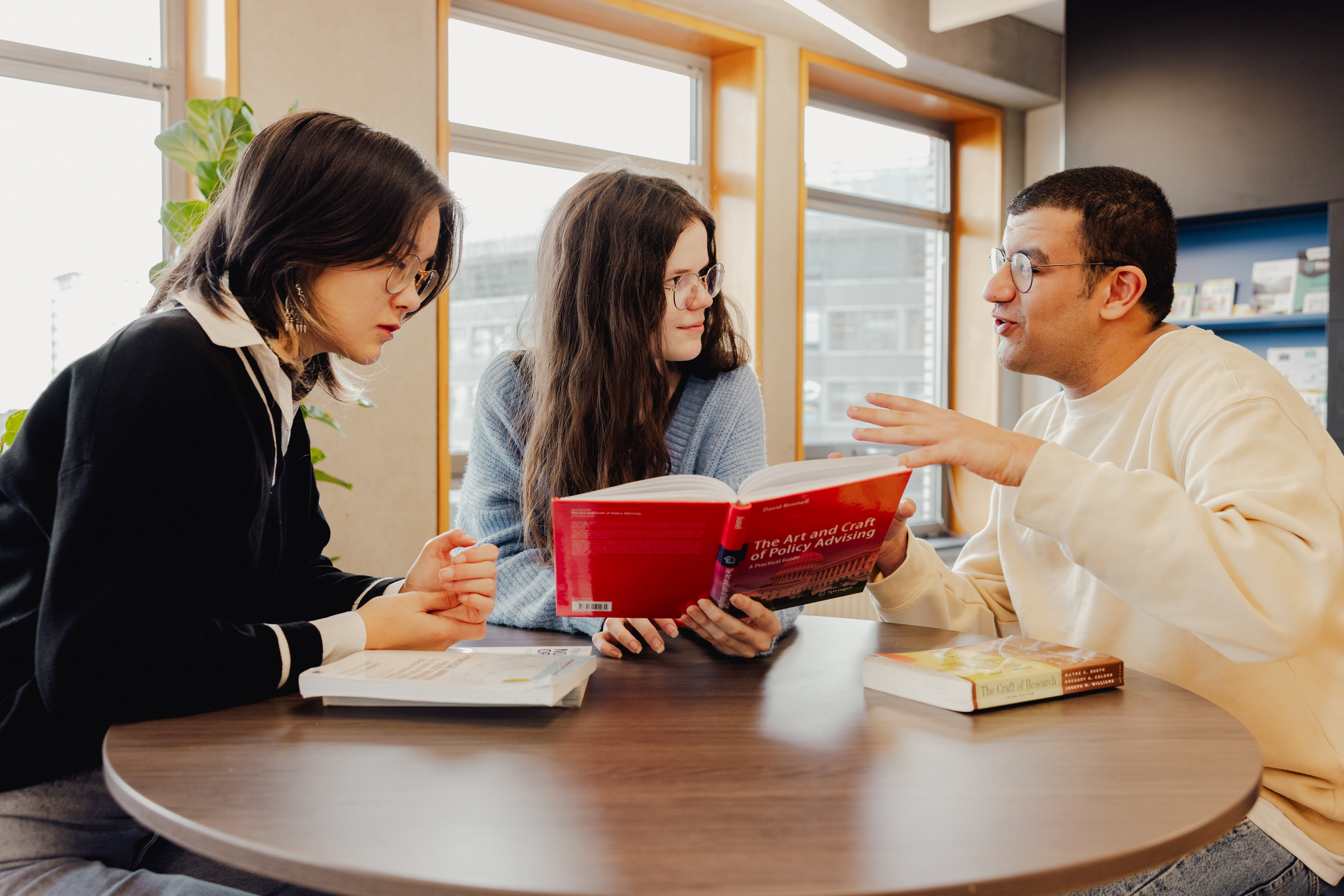
Important deadline! Apply until May 1st for this programme via Studielink. Read more
For you?
Are you open to make a positive difference in the world? Are you culturally sensitive and connected? Then it's time to open up your world at ICM.
In this full-time International Communication Management (ICM) degree programme, you develop skills and gain insights in an international environment. You tell your story through ads and learn how to solve a crisis on social media. By working with all kinds of cultures, you will soon be contributing to the world. This is business + impact.
Admission requirements
You have a Dutch diploma
To start the three-year ICM bachelor's degree programme, you should have a VWO diploma with the appropriate profile.
Below, you can find the entrance requirements for this programme when you have a Dutch diploma.
ICM is a three-year bachelor of arts programme. Unlike most THUAS programmes, which last for four years, the international three-year programme is more intensive. A propaedeutic certificate ('propedeuse') acquired at a (Dutch) university of applied sciences will not make you eligible for admission to this programme, unless you possess a VWO (or equivalent) diploma.
| Preliminary education | Required profile |
|---|---|
| Havo (senior general secondary education) | Does not qualify for admission |
| Vwo (pre-university education) |
|
| Mbo (senior secondary vocational education and training) | Does not qualify for admission |
You have a non-Dutch diploma
To enrol for the ICM 3 year programme you will need a secondary school diploma comparable to a Dutch VWO diploma and a good command of English.
Before we can decide on your eligibility, we’ll need to assess your secondary school certificate.
To make sure your certificate is evaluated fairly, we work with NUFFIC, an organisation that specialises in the assessment of international education qualifications.
Language requirements
If you were not educated in the Netherlands you usually have to submit a language test to be admitted. Depending on the type and country of your diploma you may however qualify for exemption. Please check our entry requirements page for more information.
Don’t meet the entry requirements?
Perhaps your academic background is not quite the right level. Or you need some help improving your English skills. Don’t worry. There might be some alternative options to help you get in, and prepare yourself for a successful start of your studies at The Hague University of Applied Sciences (THUAS).
21+ admissions test
If you’re 21 years old before 1 September 2022, but don’t have a diploma or a qualification that meets the entry requirements, you can take the 21+ Admissions Test. The 21+ Admissions Test is offered at several dates between January and the start of the academic year, and consists of a digital general capacity test. Please note that you can only participate if you have an EEA-nationality or residence permit for the Netherlands that is valid on the test date.
English Academic Preparation Programme
Need help with your English? If you haven’t quite reached the right level of English for your chosen Bachelor’s or Master’s degree programme, you can enrol for English Academic Preparation Programme. After the successful completion of this programme, you’ll be ready to start your degree at THUAS and you will already have a good taste of studying and living in the Hague.
The Hague Pathway College
If you’d like to apply for a 3-year bachelor programme but don’t meet the academic entry requirements, you might be interested in joining The Hague Pathway College. This foundation programme has two intakes, one in September and one in January. It offers you the chance to bring your academic level up to the required level and work on your English at an academic level at the same time.Please check www.thehaguepathway.nl for more information.
Decisions regarding your qualification for admission
There are no exceptions to the official admission requirements. The Enrolment Office is the only party that can make decisions regarding your qualification for admission based on official regulations. You can’t rely on any other sources of information for your qualification for admission.
Degree programme in figures
Programme content
What will you study each year?
Career perspective
What will you become
Online community manager
Public relations officer
Marketing communication coördinator
Project manager
Communication manager
Event coördinator
Content marketer
Internal communication advisor
Branding specialist
Social media manager
Account manager
Digital marketer
Employer branding advisor
Continue studying
There’s no need to stop your studies after graduation. You can choose a masters in Marketing Management and PR or International Business and Sustainability to delve deeper and make a positive difference in industry. For those with a couple of years’ work experience, The Hague Graduate School offers a Masters in International Communication Management to give you more of the tools you need. There are also plenty of global choices. Make your mark on a masters in Corporate Communication at the IE School of Communication in Madrid, International Journalism at Cardiff University, or Strategic Communications at Columbia University. Note that some Dutch universities require you to follow a pre-master’s course after graduating from THUAS.
Read about the Masters programmes offered at The Hague Graduate School.
Practical information
How to apply
Your enrolment request must be submitted through Studielink. Before you do, please check the official name of the programme below. Would you like to find out more about the application process first? Check our page How to apply . The key deadlines are listed here as well. This degree programme starts in September and there is no intake in February.
Tuition fee
You will have to pay tuition fees when you enrol on a bachelor's programme. You can pay in one or more instalments. If you pay in more than one instalment a small administration fee is charged.
More information about tuition fees
Scholarships
Find out more about scholarships for international students. Please note that these scholarships are one-off scholarships only, meaning that if you obtain them it is only for your first year of study.
Student finance
Dutch students qualify for extra financial support via a loan. Dutch students automatically qualify for this financial assistance and international students may be eligible if they have lived in the Netherlands for at least five years or are employed for at least 56 hours per month.
Additional Costs
You must also budget for books, excursions and field trips. You can expect to pay approximately €800 per year to cover these additional costs. During your semester abroad, you will also need to pay for tickets, housing and insurance.
Visa and residence permit
Help in choosing your study
We would like to help you make the right decision
It takes a bit of thought and research to find the right programme. The Hague University of Applied Sciences organizes various activities throughout the year to give you the best possible idea of the various studies offered. You also learn what it’s like to study at THUAS. This way, you can click on the registration button without a doubt in mind. Or you’ll know for certain it’s not right for you.
Walk in at our Study & Career Centre for…
Assistance during your studies
Study coaching and advice
We assume your time at ICM will run smoothly. However, we do offer personal assistance if you are experiencing any study problems. In the first year, you’ll be allocated a coach who can help you keep track of your study progress. They can help you improve your time management skills, or find the right people within the programme to answer more complicated questions. They will also support you if you have any personal problems that can adversely affect your schoolwork. For more information about student counsellors/student psychologists, high-performance sports, Dutch language support or studying with a functional disability, go to our page about support during your studies.
Official details of the programme
This degree programme is registered in the Central Register of Higher Education Programmes (CROHO) as follows:
Official Dutch name of degree programme: Communicatie
Official international name: Communication
Programme code (Isat): 34405
Institution code (Brin): 27UM
Both the official Dutch and the official international name of the degree programme (current at the time of your graduation) will be printed on your diploma.
For more information on the accreditation of this degree programme, see the Accreditation Organisation of the Netherlands and Flanders (NVAO) website.
Downloads
Binding Study Advice (BSA)
Collect ECTS
To continue your degree programme after the first year, you need to earn 50 of the 60 credits (EC or Credits). In some cases, the degree programme may also require that you pass a specific subject as European art of the credit requirements. We call this a qualitative requirement. If you meet the credit requirements as well as the qualitative requirement where applicable, you will receive a positive binding study advice (BSA) from the Examination Board at the end of your first year and you will be able to continue your degree programme.
If you earn less than 50 credits or don’t meet the qualitative requirements where applicable, you will receive a negative binding study advice and will have to leave the degree programme. This is why this advice is called a Negative Binding Study Advice (NBSA).
Your academic progress may be affected by personal circumstances such as illness or the professional practice of a sport. It is important that you inform the Examination Board immediately of any personal circumstances that might apply to you. The Board can take these into account when issuing its study advice.
Read all the rules for the binding study advice in Chapter 7 of the Education and Examination Rules and Regulations (OER) for your degree programme.
Looking for a different degree programme?
You might find these programmes interesting too!




